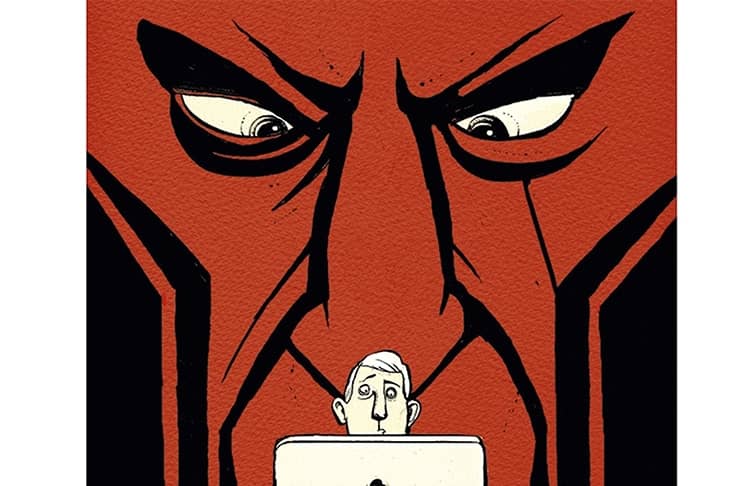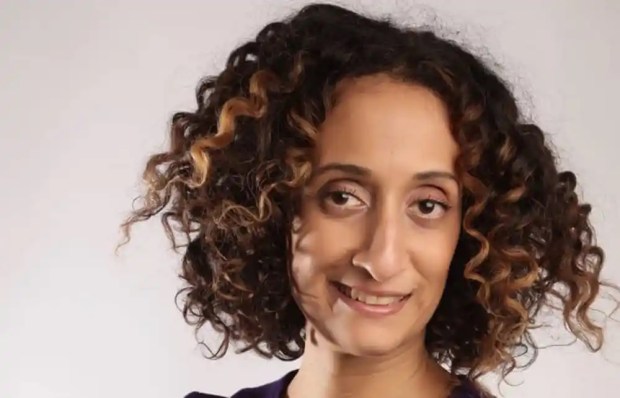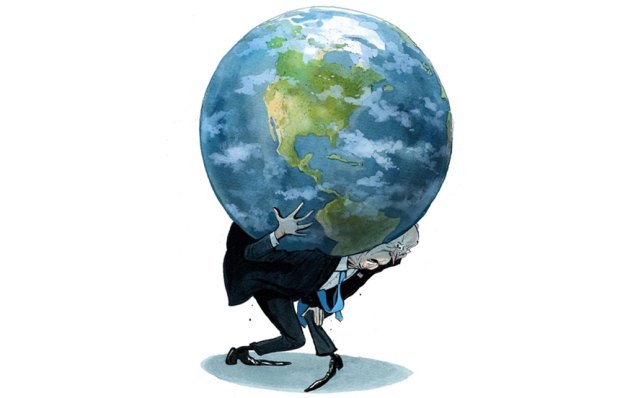No sooner had an inch or two of snow fallen on our upland areas last week than the climate-change Morlocks were out on social media, shrieking and bed-wetting themselves into a catatonic stupor. Nurse, nurse, bring the meds, quickly. ‘There! Told you!’ was the general gist. If it is snowing there cannot possibly be global warming. If one day it is a mite cold, the Earth cannot be heating up. That’s simple enough to understand, isn’t it, if you are an imbecile?
Subjected to even the mildest query many of these people immediately began to delingpole. That is, with great fury they started citing hugely eminent figures from the world of science who have proved their standpoint correct, such as Radu Ionesco, a reader in mental illness from the Central polytechnic of Chisinau who once wrote an article saying that polar bears were becoming extinct because there was too much ice around. Most of these people are on the political right, part of the ‘Everything They Tell You Is Lies’ brigade, and they were back again this week, transformed through some mysterious cybernetic process into experts on respiratory infections and the efficacy, or otherwise, of face masks in preventing the spread of disease. Pretty much the same people: climate change isn’t happening and masks are useless. Or worse than useless — actually a symbol of oppression by our overlords who may or may not have long flickering tongues and a range of optimal body temperatures.
There was of course a counter-attack from the deranged left, to the effect that people who don’t wear masks are fascists and that they should be worn everywhere, even when having sex with someone from whom you have acquired written consent. I am something of a centrist on masks. According to the magazine Nature, ‘science’ has concluded that masks are useful in both preventing transmission of Covid and catching it yourself. They didn’t say quite how useful: my guess is not very much. Just a bit useful, which is good enough for me. For the left, however, the science doesn’t really matter. As ever they are not concerned with outcomes, only with signalling their pieties, like the hipster cyclist I saw on my high street last week, pedalling away masked up.
As I’ve mentioned before, everything these days is immediately co-opted online into the political armoury of left or right. The cybersphere becomes a battleground between two atonal moronic fugues, like something by Stockhausen — and, with everyone propelled towards absolutism, the arguments devoid of doubt or shade or nuance. It is the immediacy of the internet, I suppose, that does it. However, there’s also the fact that a lot of the posters are thick, or pissed, or it’s four o’clock and the light is dimming and they need to take the dog out but first they have to vomit up some spite and bile to project at someone who has dis-agreed with them online.
What we need, then, is legislation to make these people more entrenched in their idiocies, more absolutist and antipathetic to even the most moderately stated contending arguments. Luckily, that legislation is coming our way very soon in the form of the Online Safety Bill, currently under scrutiny by a parliamentary joint committee under the stewardship of Damian Collins MP.
In its current draft, what this will do is censor not merely stuff said online that is actually illegal, which we might all applaud, but also stuff which is explicitly not illegal. As the government explained in a note accompanying the draft: ‘This type of activity can range from online bullying and abuse, to advocacy of self-harm, to spreading disinformation and misinformation. Whilst this behaviour may fall short of amounting to a criminal offence, it can have corrosive and damaging effects, creating toxic online environments and negatively impacting users’ ability to express themselves online.’
The aim, of course, is primarily to protect the kiddies who apparently all start self-harming the moment they have logged on. But the definition is broad and encompasses anything which might be considered harmful — to society, not just to an individual. Further, it will be the big social media companies that decide what should be censored and what is able to be said.
Do you trust them? We know already that Facebook, Twitter and Instagram are no lovers of freedom of speech. They are lovers, instead, of vast amounts of moolah and if governments are demanding censorship they will be happy to apply it. But they also betray a political agenda and it is one very firmly rooted in the liberal left.
That much you may have noted from their truly shocking behaviour during the last US presidential election, when stories disadvantageous to the Democrat candidate were quite brazenly suppressed and in the end President Trump had almost his entire access to social media rescinded. More recently, though, Facebook et al have been engaged in a war against those who have their doubts about the usefulness of lockdowns, the safety of anti-Covid vaccines, the necessity of social distancing and indeed the threat posed by any one of the Covid variants themselves. Posts which suggest Covid is, all in all, a bit of a doddle are removed. Last February posts were taken down which wondered if there might be a link between the new Covid vaccines and the formation of blood clots — something that turned out to be true.
The effect of this authoritarianism will be to drive dissenting views underground, and to ramp up the hysteria among the doubters thus enabling them to claim, with some accuracy, that the truth is being suppressed. In short, it will make the internet an even worse place than it is now: more corrosive, more bitter, more divided.
Got something to add? Join the discussion and comment below.
Get 10 issues for just $10
Subscribe to The Spectator Australia today for the next 10 magazine issues, plus full online access, for just $10.
You might disagree with half of it, but you’ll enjoy reading all of it. Try your first month for free, then just $2 a week for the remainder of your first year.















Comments
Don't miss out
Join the conversation with other Spectator Australia readers. Subscribe to leave a comment.
SUBSCRIBEAlready a subscriber? Log in